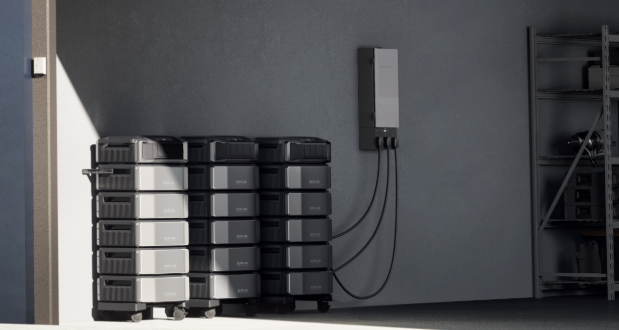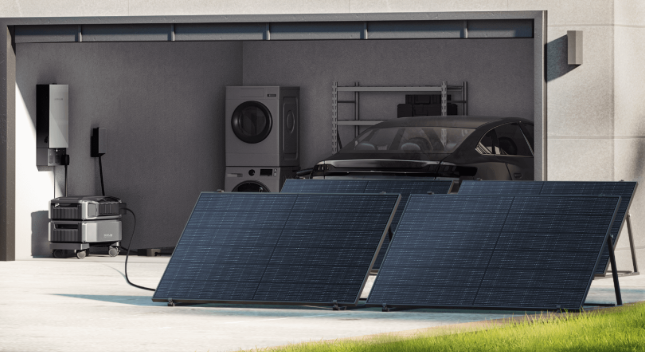With Extreme Weather on the Rise, Can Your Home Power Itself?
- What Is Home Backup Power and Why Does It Matter Now?
- How Long Can You Stay Powered Without the Grid?
- What Kind of Backup System Can Handle Extreme Weather?
- How the EcoFlow DELTA Pro Ultra Powers Through Uncertainty
- What Does Real Energy Independence Look Like?
- How Do You Choose the Right Backup Power System for Your Home?
- What Are the Hidden Costs of Not Having Backup Power?
- Conclusion: You Don’t Need to Wait for the Next Outage
- FAQs: Home Backup Power You Didn’t Know You Needed
Storms are getting stronger, and blackouts last longer. Homeowners across the country are asking the same question: How do I keep the light on when the power goes out? Traditional solutions like flashlights and backup batteries no longer provide enough protection. What’s important now is reliable, long-lasting home backup power that keeps your home running regardless of what happens.
What Is Home Backup Power and Why Does It Matter Now?
Home backup power means having a second power source ready when your main one fails. It may be during a thunderstorm, wildfire season, or a sudden equipment failure on the local grid. In the past, short outages were easy to live with. Now, many families face hours or even days without power. Food goes bad. Heating and cooling shut off. Work-from-home setups break down.
Climate events are becoming more intense and less predictable. In 2023, there were record outages in most states. In many areas, backup power is not a luxury feature. It’s a basic method of protection.
How Long Can You Stay Powered Without the Grid?
This question matters most when you’re already in the dark. Home backup power isn’t just about starting a generator or flipping a switch. It’s about matching power to real needs. A phone charger pulls very little energy. An electric heater or fridge uses far more.
Your backup system should support:
- Critical appliances like refrigerators, freezers, and medical devices
- Heating or cooling for at least one room
- Internet routers, lighting, and basic outlets
- Possibly a sump pump or water heater
Some homes need power for just a few hours. Others require energy for multiple days. Planning without knowing your average consumption leads to either overspending or running out too soon.


What Kind of Backup System Can Handle Extreme Weather?
Here’s where many systems fail. A small generator might be fine in summer but struggle in a snowstorm. A single battery might support lights for a night, but not your HVAC in a heatwave.
A real home backup power solution for extreme weather must be:
- Scalable so you can expand if your needs grow
- Safe with certified components that hold up under pressure
- Quiet and clean enough for indoor or close-to-home use
- Flexible in charging, whether from solar, grid, or generator
Many regions now deal with rolling blackouts or multiday outages. Without a system that can recharge during downtime, you’re stuck. Backup power needs to adapt to the reality of today's weather.
How the EcoFlow DELTA Pro Ultra Powers Through Uncertainty
One system offers flexibility, high capacity, and readiness for long outages: the EcoFlow DELTA Pro Ultra. This advanced home battery can start small and expand up to 90 kilowatt-hours of energy storage. That covers most homes for several days, depending on usage.
Key features include:
7.2 kilowatt output from a single unit, scalable to 21.6 kilowatts with expansion
Support for whole-home backup when paired with a transfer switch
Works with solar, generator, and wall charging
Quiet operation with no fumes and minimal setup required
Runs high-demand appliances without interruption
For households in storm-prone or remote areas, this level of home backup power gives lasting security during difficult times.
What Does Real Energy Independence Look Like?
Being energy independent means staying functional when the grid is offline. It means keeping your refrigerator cold, your medical devices powered, and your internet running. You are not waiting in line for ice or gasoline. Your home remains a place of safety and comfort.
To reach that point, you need:
- A clear understanding of your usage patterns
- Reliable backup storage with room to scale
- Charging options that keep you powered through cloudy days
- Real-time control through app or panel monitoring
Families who prepare in advance continue their lives with less stress. They stay connected, warm, and fed when others cannot.


How Do You Choose the Right Backup Power System for Your Home?
Start with your location. Do you face hurricanes, wildfires, snowstorms, or heat waves? Then look at your lifestyle. Do you work from home? Have a medical device that must stay on? Do you have young children or elderly relatives?
Ask yourself:
- How long can I manage without power?
- What must stay powered no matter what?
- Do I want automatic switchover or manual control?
- Is solar charging important to me?
Don’t guess your home’s needs. Review your past power bills. Use a load calculator. If unsure, talk to a licensed electrician who can guide the setup.
What Are the Hidden Costs of Not Having Backup Power?
Some homeowners wait too long. The costs of a serious outage often go beyond money:
- Spoiled groceries and wasted meals
- Water damage from disabled sump pumps
- Medical risks from failing equipment
- Frozen or overheated pets
- Canceled work, school, or deadlines missed
Even short outages can lead to long-term damage. Insurance doesn’t always cover these losses. The true cost is in the stress, disruption, and helplessness that follow.
Conclusion: You Don’t Need to Wait for the Next Outage
Home backup power is no longer a niche concern. It’s a growing necessity. With extreme weather becoming a regular part of life, the time to prepare isn’t after the lights go out. It begins now.
Whether you choose a basic setup or a full-scale solution like the EcoFlow DELTA Pro Ultra, what matters is having power you can count on. Your home can stay bright, safe, and functional during the next outage. The sooner you plan, the better protected you are.
FAQs: Home Backup Power You Didn’t Know You Needed
Q1. Can home backup power systems be installed in apartments or condos?
Yes, but there are important limitations. Most apartment and condo residents cannot usually access private outdoor spaces or breaker panels, commonly needed for hookups for large batteries or generators. Portable battery systems can still supply power to small appliances, routers, and personal devices during outages, however. Look for small units that are safe to use indoors and that can be charged through wall outlets or portable solar panels. Always check with building management or your HOA before installing any backup system that interfaces with common electrical systems.
Q2. How does backup power interact with modern smart home systems?
Backup power systems are able to sustain most of the smart home devices, including security cameras, Wi-Fi routers, lights, thermostats, and voice assistants. You will need to choose the right size of the system, though, to offer both the power usage and the demand for stable power. For example, if your smart thermostat is controlling your HVAC, a power loss to it could cause heating or cooling to come to a complete stop. Some residential backup power systems come with app interfaces or smart transfer switches to be able to monitor these devices and determine where to divert power. It may be worth trying your smart devices in a trial run to determine any unseen issues.
Q3. Is it safe to store a home backup battery inside the house?
Yes, if the unit is certified and intended for indoor application. High-quality lithium iron phosphate (LiFePO4) batteries, like those in newer backup solutions, have built-in safety features like temperature control, short-circuit protection, and fireproofing. They are also fume- and noise-free and don’t need ventilation like fuel-powered generators. You ought to keep them in a dry, cool place away from materials that can catch fire, however. Do not put any other objects on top of the unit, and follow the manufacturer’s temperature and clearance regulations to prevent accidental shutdown or reduced battery life.
Q4. What happens if my solar panels are producing power during a blackout?
Unless you have a hybrid inverter or an off-grid battery system, your solar panels will turn off during a power outage. This is for safety reasons to help prevent utility workers from getting hurt. However, if you have a home backup battery system that has the ability to function off-grid, your solar panels can keep charging the battery during the daytime. In that case, your home uses stored energy and any solar energy made at the moment. This setup needs careful planning and must follow electrical rules, so always talk to a qualified solar installer for help with the setup.
Q5. How do I maintain a backup power system to keep it ready long-term?
Maintenance depends on the system type. For battery-based systems, you need to check the charge level, update software, and cycle the battery every couple of months to keep the cells healthy. Dust the device and check cables for wear. If your system is solar panel or generator-powered, test those inputs every three months to be sure that they’re working. Set reminders to check connections before storm seasons. Most modern systems are equipped with a remote diagnostics app, which helps in identifying problems before they affect performance. Regular maintenance can stretch your system for a few more years and prevent surprises when you really have an emergency.
For press requests or interview opportunities, reach out to our media team
media.na@ecoflow.com